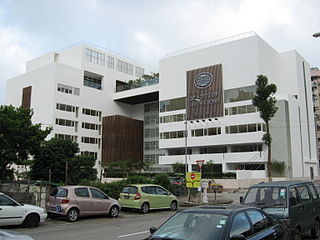Education in Kenya refers to the education system in Kenya. It is considered a basic right that should be offered to every individual. Education in Kenya predates to as early as the 18th century among the Swahili people. The earliest school was established by missionaries in Rabai. During colonial rule, a limited number of Kenyans were able to access higher education opportunities abroad.
The Academia Británica Cuscatleca (ABC) is an established and highly regarded international bilingual school in El Salvador. It is a community of some 1400 students and is fully accredited by Council of International Schools (CIS), the International Baccalaureate Organisation (IBO), the International Primary Curriculum (IPC) and the Values-Based Trust for Education (VBFT).

Friends School Kamusinga (FSK), popularly known as Kamu/Frishka, is a Kenyan Quaker national school established in 1956 and located in Kimilili, Bungoma County, Kenya. The school is located 409.9 kilometres from Kenya's capital city, Nairobi. It is annually ranked among the top schools nationwide in KCSE and has many notable alumni across business, creative arts, sports, engineering and politics.
The Kenya National Examinations Council (KNEC) is the national body responsible for overseeing national examinations in Kenya. Its current chairman is Professor Julius Omondi Nyabundi who succeeded Professor John Onsati. This council was established under the Kenya National Examinations Council Act Cap 225A of the Laws of Kenya, in 1980. In 2012 this act was repealed and replaced with KNEC Act No.29 of 2012.
Educational stages are subdivisions of formal learning, typically covering early childhood education, primary education, secondary education and tertiary education. The United Nations Educational, Scientific and Cultural Organization (UNESCO) recognizes nine levels of education in its International Standard Classification of Education (ISCED) system. UNESCO's International Bureau of Education maintains a database of country-specific education systems and their stages. Some countries divide levels of study into grades or forms for school children in the same year.
The Kenya Certificate of Primary Education (KCPE) was a certificate awarded to students after completing the approved eight-year course in primary education in Kenya. The examination was supervised by the Kenya National Examination Council (KNEC), an examining body in Kenya under the Ministry of Education. The same body also conducted and regulated the Kenya Certificate of Secondary Education (KCSE), a certificate awarded to students after completing secondary education. KCPE and KCSE were both started in 1985 when the 8-4-4 system of education was introduced in Kenya.The last KCPE examination, under this system was done on November 1, 2023 at 11am. These exams were replaced by KPSEA.
Kianda School is a private, all-girls day school with a Catholic ethos located in the Westlands area of Nairobi, Kenya. The school was opened in 1977 by The Kianda Foundation, a non-profit organisation that aims to better Kenyan women's lives through education and Christian values. The school began with 40 students but has now grown to a student body of about 830 in both its primary and secondary school sections.
The Kenya Certificate of Secondary Education (KCSE) is an academic certificate awarded to candidates upon completion of secondary education in Kenya.
Mang'u High School is a Kenyan Roman Catholic National High School established in 1925, located in Kiambu County along the Nairobi-Thika Highway six kilometres (3.7 mi) from Thika, Kenya. Mang'u High School is ranked among the top schools nationwide in Kenya Certificate of Secondary Education and has many eminent alumni including one Kenyan president, several vice presidents, a Central Bank of Kenya governor and a former Cardinal.

The School of the Nations is a Baháʼí-inspired school located in Taipa, Macau, owned by the Badi Foundation.

St. Thomas' College, Dehradun is a co-educational Indian Certificate of Secondary Education school in Dehradun, the capital of the state of Uttarakhand in India, founded in 1916. It is located in the heart of the city of Dehra Dun on Cross Road. The school is regarded as among the best schools in India based on its consistent results in both the 10th and 12th examinations and the magnitude of extra-curricular activities and sports in its culture.
Nakuru Boys High School is an all-boys high school in Nakuru, Kenya. It is among the 17 traditional national schools of Kenya, that have been in existence for more than 30 years.
The Kenya High School is a public girls' high school located on Mandera Road in the upmarket Kileleshwa Ward and suburb of Dagoretti North Sub-County in Kenya's capital city, Nairobi.
Moi High school - Kabarak is located 20 km from Nakuru City, in Kenya's Rift Valley Province along the Nakuru – Eldama Ravine road. It shares the same compound with Kabarak University and Kabarak Primary.

The 8-4-4 System educational program is a system of education in Kenya with eight years of primary education, four years of secondary education and four years of university education. The system was introduced in 1985 to replace the 7-4-2-3 curriculum, which consisted of seven years of primary school, four years of lower secondary school, two years of upper secondary school and three years of higher education. The 7-4-2-3 system had been adopted when Kenya was part of the initial East African Community. Following the introduction of 8-4-4, CPE became KCPE while KACE became the Kenya Certificate of Secondary Education (KCSE). Primary school was made free and mandatory, and secondary and higher education were subsidized by the government.
Gongo Primary School is a Kenyan co-educational day primary school located in the Central Gem ward of Siaya County, Nyanza Province.

The Green Garden Schools are a group of Kenyan private schools located in Kikuyu, Kiambu County, and Rongai just outside Nairobi, Kenya. The schools were founded by Prof. Peter Keiyoro and Esther Njenga in 1991. The schools are independent 8-4-4 curriculum co-educational day and boarding schools offering nursery, primary and secondary schooling.

Kapsabet High School popularly known as KB is a public national high school for boys located in Kapsabet in Nandi County, about 40 kilometers from Eldoret.
Gladwell Jesire Cheruiyot is a Kenyan politician and a current member of the Kenyan Africa National Union (KANU) party since 2017. She is the former Women Representative for Baringo County





